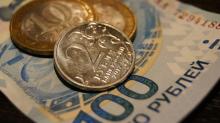Economic history of Russia
Russia earns less from oil and spends more on war
The Russian ruble's wobble in value has exposed a crack in President Vladimir Putin's fortress economy, a vulnerability quickly plastered over by the Kremlin's economic team in a move that allowed the currency to regain its footing, at least for now.
- Read more about Russia earns less from oil and spends more on war
- Log in to post comments
Russia's central bank hikes interest rates to prop up ruble
Russia's central bank yesterday raised its key interest rate by 3.5 percent, a move designed to fight inflation and strengthen the ruble after the country's currency reached its lowest value since early in the war with Ukraine.
The decision was announced after an emergency meeting of the bank's board of directors was called a day earlier as the ruble declined.
The Ruble reached a two-year High against the Dollar and the Euro
The Russian ruble reached a two-year high against the dollar and the euro today, mostly due to strict capital controls in the country and despite the announced next package of EU sanctions, Reuters reported, quoted by BTA.
In morning trading, the ruble rose 0.7 percent against the dollar to 68.62 rubles, its strongest position since June 2020.
Bulgarian Economist: Paying for Gas in Rubles aims to increase demand for the Russian Currency
The decision to pay for Russian gas in rubles was intended as a measure against sanctions imposed on Russia. This was explained by the economist Daniel Vassilev on Nova TV. According to him, the sanctions were aimed at destroying the ruble, Russia tried to increase its demand, with a solution that would increase its value.
Russia introduces the Ruble in the Kherson region of Ukraine
The ruble will be introduced in the Russian-controlled Kherson region of Ukraine on May 1, a spokesman for the region's pro-Russian military-civil administration said.
S&P downgrade indicates Russia headed for historic default
The credit ratings agency Standard & Poor's has downgraded its assessment of Russia's ability to repay foreign debt, signaling rising prospects that Moscow will soon default on external loans for the first time in more than a century.
Eleven people detained in relation to high-profile lawyer murder
At least 11 people have been detained in relation to the murder of a high-profile lawyer by armed assailants in Istanbul.
Şafak Mahmutyazıcıoğlu, a 42-year-old lawyer, was shot dead on Jan. 26 following a fight that broke out at a restaurant.
Hypocrisy over defense spending
Athens's defense procurement plans have been met with raised eyebrows and complaints in certain European capitals. Beyond the competition that has always existed between France and Germany in this field, Greece is being accused of spending European taxpayers' money on a shopping spree.
- Read more about Hypocrisy over defense spending
- Log in to post comments
Turkish watchdog head backs trade in local currencies
Lending in local currencies should be considered as an opportunity to enhance trade relations with countries like Russia and China, head of a Turkish banking watchdog said on Dec. 21.
Lira, ruble hit 6-month high as dollar swoons
Russia's ruble and Turkey's lira lead a gang of top emerging market currencies to six-month highs on April 29 as signals this week that U.S. interest rates are likely to stay ultra-low cemented a third month of losses for the dollar.
- Read more about Lira, ruble hit 6-month high as dollar swoons
- Log in to post comments










